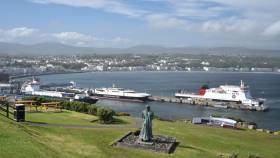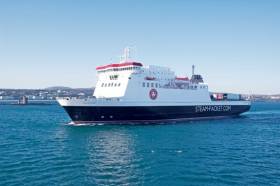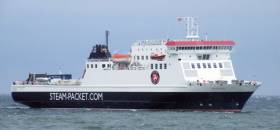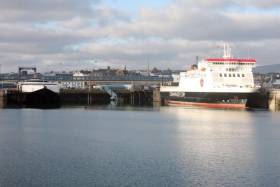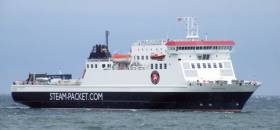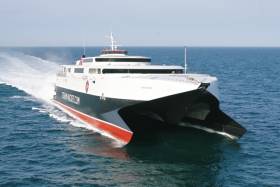Displaying items by tag: IOM Steam Packet Co
Isle of Man Sees Significant Response to Sea Services Survey
#Ferry - In response to an Isle of Man services survey of ferry operations this was the largest the department has seen.
That's according to the Infrastructure Minister Ray Harmer, reports Manx Radio
The results of the survey are set to help form the new Sea Services agreement between the department and the Isle of Man Steam Packet company.
Mr Harmer says the response has been encouraging and to listen for more of his comments click the radio station's link here.
#FerryNews - In an announcement today, the Manx Government has plans to acquire the Isle of Man Steam Packet Company (IoMSPC) for £124m.
If approved by Tynwald later this month, BBC News writes the deal would see the government commit to purchase 100% of MIOM Ltd, the IoMSPC's parent company.
Chief Minister Howard Quayle said: "Acquiring the national asset is a once-in-a-generation opportunity."
The IoMSPC provides freight, passenger and vehicle services between Douglas and five ports in the UK and Ireland.
The government has been considering its options since rejecting the company's revised offer of a new strategic sea services agreement in July 2017.
It had proposed to invest £170m in services - including spending £65m on two "state-of-the-art" ships - had its contract been extended.
Treasury Minister Alfred Cannan said: "The deal would immediately bring ferry operations into public ownership but government would not take over the day-to-day running of services."
He said government could "put in place a new agreement within 12 months" if the deal goes ahead.
For more on this story, click here.
Isle of Man Steam Packet Terminal to Move in Liverpool
#FerryNews- Manx Radio reports on a project that has officially begun work that will eventually see a new ferry terminal for passengers.
The first phase of the £5 billion Liverpool Waters scheme got under way with a groundbreaking ceremony earlier this week.
It will eventually see a facility for the Isle of Man Steam Packet built further up the Mersey, as the current one (Princess Parade) makes way for a new international cruise ship terminal.
Everton Football Club also plans to build a new stadium at Bramley-More Dock.
Development director Lindsey Ashworth said 2018 will be 'a significant year' for Liverpool Waters, which has been called the biggest regeneration project in Europe.
Manx Government Considers Buying Isle of Man Steam Packet
#ferrynews - Manx Ministers are drawing up possible plans to buy the Isle of Man Steam Packet, iomtoday has learned.
The move comes as negotiations continue with the ferry operator over a revised strategic sea services deal - and as the Packet announced a 6.4% increase in some fares from 1 January, 2018.
In July, the Tynwald voted not to accept the Steam Packet offer to government and to opt instead to continue negotiations for a better deal. The Packet’s offer had included a pledge to invest £170m in a new fleet, facilities and fare initiatives.
But it is understood that the Council of Ministers is now seriously contemplating taking the ferry operation into public ownership.
Nationalisation or acquisition of the Steam Packet were outlined in a review of options presented in a government report to Tynwald in November last year.
For more on the development, click here.
#FerryInvestment -The Isle of Man Steam Packet Company has set out its vision for the future of services that includes investment of £170m in new vessels, port facilities and increased year-round passenger capacity.
Also as part of plans to improve ferry services are fare reductions, more special offers and a new frequent traveller scheme.
The Steam Packet will invest in two new vessels and will commit to retaining Ben-my-Chree to provide comprehensive passenger and freight back-up to the fleet.
Late last year Isle of Man Government announced it was considering the future of strategic sea services for the Island. The current User Agreement is due to end in 2026 and the Steam Packet Company has now outlined its vision for continuing to provide services beyond that date.
The details were presented to members of Tynwald on Tuesday and released to the public the same day. They are currently available to view online at http://goo.gl/SwDjOw and the Steam Packet Company is arranging for a printed version to be delivered to homes and businesses Island-wide with the Isle of Man Courier in June. Copies will also be available from the Ferry Travel Shop at the Sea Terminal in Douglas.
It is hoped the offer can be taken to July Tynwald for debate as, the earlier a decision is made, the sooner investment can begin and residents, visitors and businesses start to benefit.
Steam Packet Company Chief Executive Mark Woodward said: ‘We are not just a company which serves the Isle of Man; we are part of the Manx community. Our management team lives and works here, we employ more than 300 Isle of Man residents and we spend significant sums in the local economy. As part of the Isle of Man, our interests are fully vested in what is best for our Island.
‘Since the start of the User Agreement there has been major private investment in vessels, much lower fares (halved in real terms) with improved offers and availability, and significant marketing each year to promote the Isle of Man.
‘We want to consolidate these benefits and provide a platform for further investment and improvements in service delivery for another generation. If a new Strategic Sea Services Agreement, to guarantee services beyond 2026, can be reached this year we will bring forward our planned investment.’
If an agreement is made this year, the Company is committed to delivering a replacement for Ben-my-Chree by 2019/21 and Manannan by 2022/23. MV Arrow would be retained as freight back-up until Ben-my-Chree is replaced, after which time the Ben would become the Company’s permanent third vessel. This gives the fleet comprehensive passenger and freight back-up, as well as additional capacity and self-sufficiency during the TT and Festival of Motorcycling.
The Company would increase passenger and freight capacity year-round to meet the needs of a growing population and would also guarantee that more special offer seats are available each year. A new frequent traveller scheme would be introduced and is expected to benefit 10 times more passengers than the previous scheme which was discontinued some years ago.
There would also be an agreement for the Company to share extra revenue growth, above an agreed threshold, to fund additional low fare and marketing initiatives. This would mean that a proportion of profits would be ring-fenced and used to target specific potential growth areas of the visitor economy or other initiatives aimed at growing passenger numbers.
The offer also includes the retention of the Manx RPI cap on standard fare increases, a commitment to formal service reviews every three years and a promise to publish Irish Sea fare comparisons every year.
Mr Woodward added: ‘Unlike some ferry firms servicing island communities, the Steam Packet Company does not and will not require any government subsidy. We meet the costs of delivering our services ourselves. We will do this while providing guaranteed standards and levels of service and it is we, not the Government or Manx public, that take all the commercial downside risk of doing this.
‘We look forward to further discussions with the Isle of Man Government and the Manx public about the future of Island sea services.’
To read the proposal visit http://goo.gl/SwDjOw
#ContingencyPort - The Isle of Man Steam Packet reports IOMToday is to consider using Holyhead in Anglesey as a ‘contingency’ destination.
This afternoon (yesterday) it was announced by the operator to conduct a berthing trial at the Welsh port to assess its suitability as a back-up alternative to Heysham and Birkenhead.
Tomorrow night (today) the ropax Ben-my-Chree will sail to the harbour for the trial.
Passengers are not affected as the vessel is not scheduled to operate any services during the period.
Steam Packet Company chief executive Mark Woodward said: ‘This is necessary to ensure maximum flexibility for our services, and robust contingency measures for secure lifeline sea services for the Isle of Man.
To find out more what the chief executive had to say on considering the Angelsey port, click here.
Steam Packet Offer Manx Government New Services Agreement
#ServiceAgreement - The Isle of Man Steam Packet Company has presented an ‘offer’ to the Manx Government for a new strategic sea services agreement to replace the user agreement.
The IOM Today writes that last summer the government issued an ultimatum to the Steam Packet – make us a ‘significantly enhanced’ offer or ferry services will be put out to competition.
Now the ferry operator’s chief executive, Mark Woodward, has confirmed an offer has been made which he hoped Tynwald will get the chance to support in the next few months.
The company has not yet disclosed details of the ‘offer’ but Mr Woodward told the Courier it will be made public and that it will involve investment in new ships.
Welcoming the appointment of Vision Nine as the new promoter for the TT and Classic TT, Mr Woodward said the offer to government would ‘help address the crucial issue of visitor capacity’.
For more on the story, click here.
Isle of Man Steam Packet Ropax to Have Biennial Overhaul
#Overhaul - The Isle of Man Steam Packet Company ropax Ben-My-Chree is from tomorrow (12th April) to begin a biennial overhaul.
The 12,504 tonne ferry, which has served the Isle of Man for 18 years, will go into dry dock for three weeks for the scheduled ‘service’.
Work will include a technical overhaul as well as refurbishment of some of the passenger areas, including improvements to the seating, general decor and lighting in the Executive, Niarbyl and Premium lounges. The vessel is due to return to service on 4th May.
During the overhaul MV Arrow, which the Steam Packet Company currently has on charter, will provide freight services. Fast craft Manannan will operate passenger services with a schedule which was published last autumn.
From 12th April until 3rd May inclusive sailings will depart Douglas for Heysham at 08.00 and for Liverpool at 15.00, with the return sailings departing Heysham at 12.00 and Liverpool at 19.15. The only exceptions will be on 20th and 27th April when Manannan will operate the Belfast route instead of Heysham.
A coach service will be provided at Heysham to transfer foot passengers to and from Lancaster railway station.
Chief Executive Mark Woodward said: ‘It is a statutory requirement that Ben-my-Chree undergoes a technical overhaul every two years, and also an opportunity for us to invest in upgrading the facilities for passengers and crew.
‘This does mean the vessel is unavailable for three weeks, requiring some changes to our sailings during this period. We published Manannan’s revised schedule last autumn to give as much notice as possible and will assist foot passengers travelling onwards via Heysham by providing a coach to and from Lancaster station.
‘Freight services will be provided by MV Arrow, once again underlining the value to the Island of the significant investment we are making to retain the vessel.
‘Ben-my-Chree will be back soon, fully serviced and ready for another busy summer season.’
Fastcraft Manannan to Resume IOM Seasonal Services
#RoutesResume - In less than a fortnight, seasonal Douglas-Liverpool sailings begin on 17th March when Isle of Man Steam Packet Company fast craft Manannan returns to service. The resumption will also mark sailings on Dublin and Belfast routes during March.
Once again passengers will be able to sail in and out of the heart of Liverpool every day on Manannan. There are more than 900,000 offer seats available on Steam Packet Company sailings during 2016 including popular Kids Go Free offers this summer.
The city is also a great gateway for any break in the UK, with the motorway network just minutes from the Pier Head landing stage and excellent rail, coach and bus links within walking distance. This location is also convenient for tourists heading to the Isle of Man.
The season of Irish services begins on 23rd March with the first sailing of the year to Dublin, and Belfast services resuming on 25th March.
Steam Packet Company Chief Executive Mark Woodward said: ‘Manannan is ready for another busy season as services to Liverpool, Belfast and Dublin resume. We are looking forward to welcoming many passengers on board the fast craft, both Island residents heading across and visitors travelling to discover the wonders of the Isle of Man.’
Manx Parliament to Get Say on Liverpool Landing Stage Plan
#LiverpoolBerth - Talks by the Manx Parliament, the Tynwald over a new landing stage in Liverpool for Isle of Man ferries are close to completion, reports IOMToday.
The island's Infrastructure Minister, Phil Gawne gave an update in the House of Keys over plans for a new landing stage in Liverpool to replace the life-expired facility at Pier Head - and he assured MHKs that any proposals would go to Tynwald for approval.
He said officers from his department have been meeting with Peel Holdings to discuss future plans for suitable long-term facilities for Manx vessels.
Topics covered have included where the new landing stage should be located, what facilities should be provided, access, issues surrounding vessel berthing and the likely heads of terms that would lead to a contract.
For more on the story click here plus a photo of passengers embarking in 1978 the Steam Packet's old ferry, Lady of Mann. The vessel also served on their Irish routes now operated by a fastcraft and on occasions a ropax ferry.


























